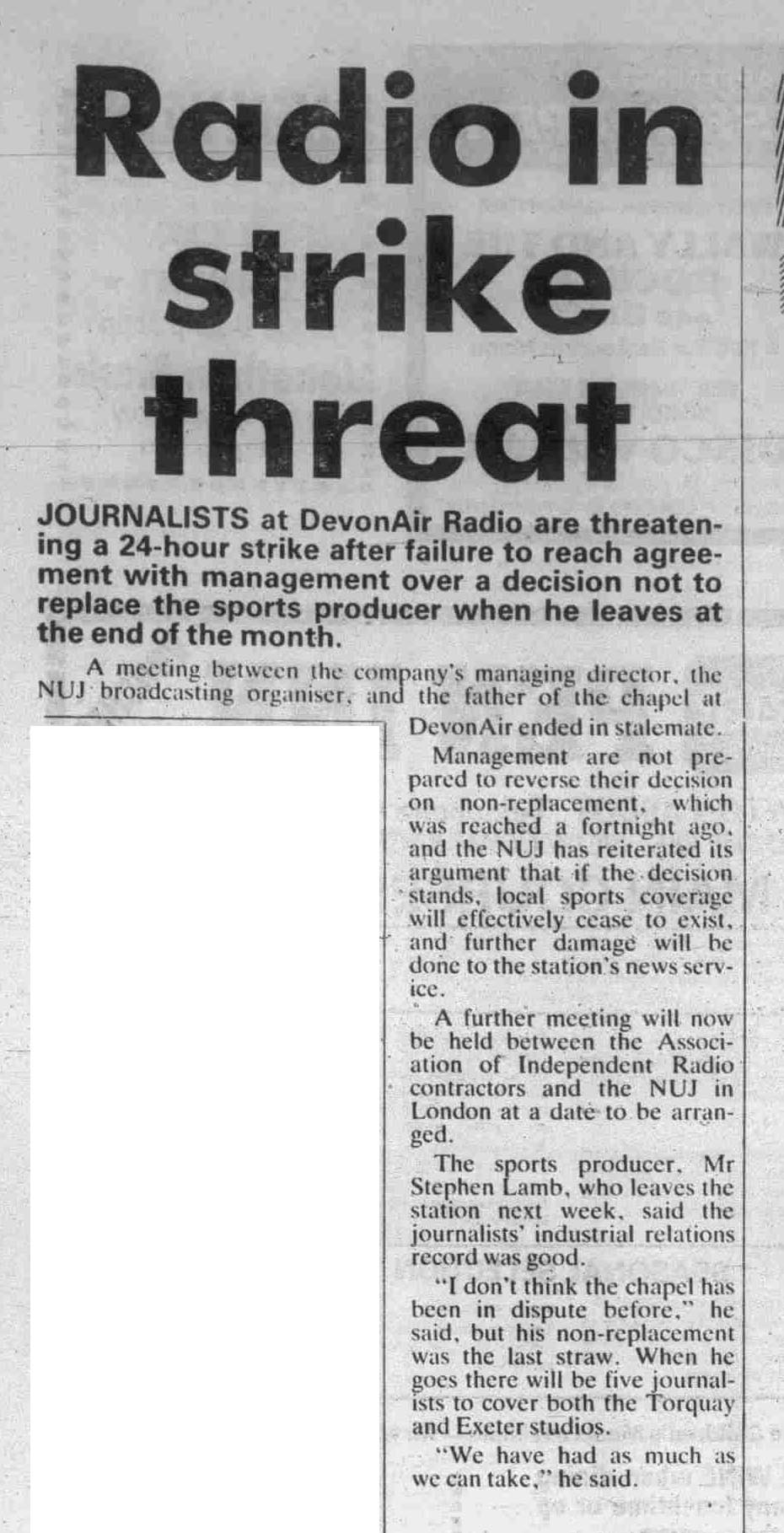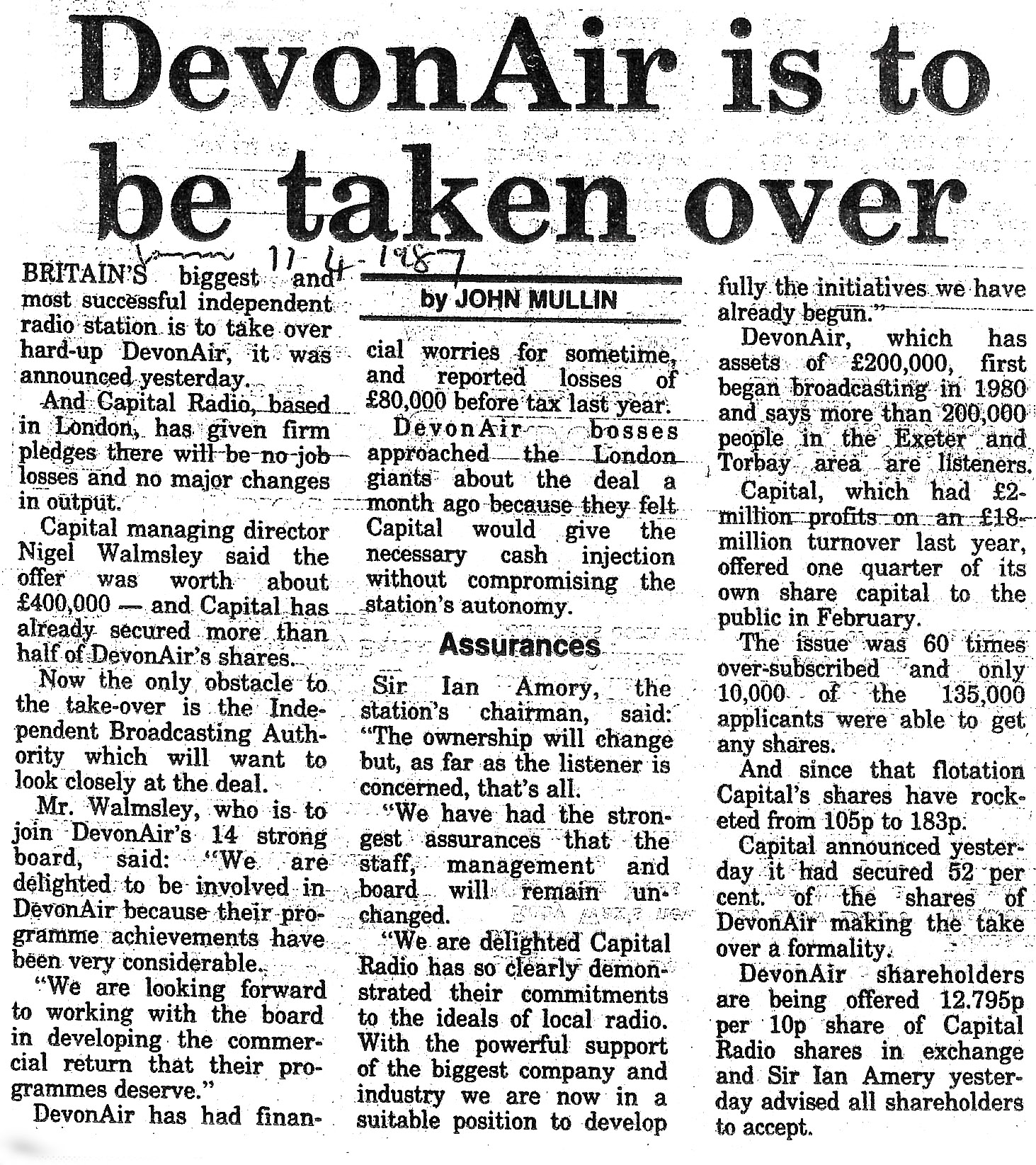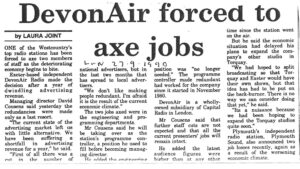
Following Mason’s departure, Maurice Vass (pictured left), formerly of Trident Television, was brought in as launch Managing Director. He was joined by Jeff Winston (right), previously of Pennine Radio and Granada’s World in Action, who became DevonAir’s first Programme Controller. Together, Vass and Winston steered the station through a highly successful launch in late 1980, delivering both strong audience figures and encouraging financial results over the next two years.
Despite this early momentum, tensions between the two soon emerged. Vass and Winston held conflicting visions for DevonAir’s future, and their strained working relationship—lacking what one insider called “basic chemistry”—began to affect internal morale and eventually drew press attention. In 1982, Winston resigned, citing unresolved disagreements. Vass stepped down shortly after.
In the wake of their departures, Bob Kennedy, a DevonAir director, was appointed interim Managing Director. Then, in 1983, Ken Whittaker was named as the station’s third full-time Managing Director in as many years—an effort to restore leadership stability. Yet Whittaker’s tenure proved short-lived as well; by 1984, the Chairman’s Report noted he had “left the company.
The early clashes in the history of DevonAir were notable and changed the face and direction the station took early on:
Your Angry Radio Station – 1982
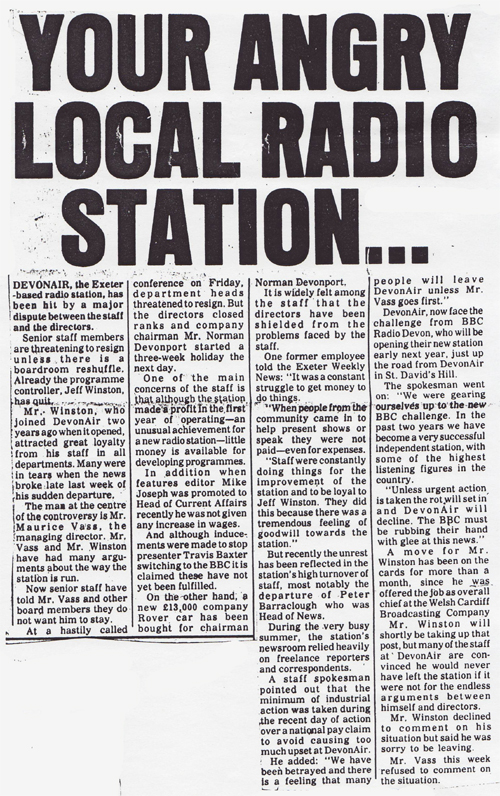
“DevonAir, the Exeter based radio station, has been hit by a major dispute between the staff and the directors.
Senior staff members are threatening to resign unless there is a boardroom reshuffle. Already the programme controller, Jeff Winston, has quit.
Mr. Winston, who joined DevonAir two years ago when it opened, attracted great loyalty from his staff in all departments. Many were in tears when the news broke last week of his sudden departure.
The man at the center of the controversy is Mr. Maurice Vass, the managing director. Mr. Vass and Mr. Winston have had many arguments about the way the station is run.
Now senior staff have told Mr. Vass and other board members they do not want him to stay.
In a hastily called conference on Friday department heads threatened to resign. But the directors closed ranks and company chairman Mr. Norman Devonport began a three week holiday the next day.
What the main concerns of the staff is that although the station made a profit in the first year of operation – an unusual achievement for a new radio station – little money is available for developing programmes.
In addition when features Editor Mike Joseph was promoted to Head Of Current Affairs recently he was not given any increase in salaries.
And although inducements were made to stop presenter Travis Baxter switching to the BBC it is claimed these have not yet been fulfilled.
On the other hand, a new £13,000 company Rover car has been bought for the chairman Norman Devonport.
It is widely felt among the staff that the directors have been shielded from the problems faced by the staff.
One former employee told the Exeter Weekly News “it was a constant struggle to get money to do things.
“When people from the community came in to help present shows or speak they were not paid – even for expenses.
“Staff were constantly doing things for the improvement of the station and to be loyal to Jeff Winston. They did this because there was a tremendous feeling of goodwill towards the station.”
The recent unrest has been reflected in the station’s high turnover of staff, most notably the departure of Peter Barraclough who was Head Of News.
During the very busy summer, the station’s news room relied heavily on freelance reporters and correspondents.
A staff spokesman pointed out that the minimum of industrial action was taken during the recent day of action over a national pay claim to avoid causing too much upset at DevonAir.
He added “We have been betrayed and there is a feeling that many people will leave DevonAir unless Mr. Vass goes first.”
DevonAir now faces the challenge from BBC Radio Devon, who will be opening their new station early next year, just up the road from DevonAir in St. Davids Hill.
The speaker went on “We were gearing ourselves up to the new BBC challenge. In the past two years we have become a very successful independent station, with some of the highest listening figures in the country.
“Unless urgent action is taken the rot will set in and DevonAir will decline. The BBC must be rubbing their hands with glee at this news.”
A move for Mr. Winston has been on the cards for more than a month, since he was offered the job as overall chief at the Welsh Cardiff Broadcasting Company .
Mr. Winston will shortly be taking up that post, but many of the staff at DevonAir are convinced he would never have left the station if it were not for the endless arguments between himself and directors.
Mr. Winston declined to comment on his situation but said he was sorry to be leaving.
Mr. Vass this week refused to comment on the situation.
Context and Background
DevonAir faced increasing turmoil due to disagreements between the station staff and its directors. The core issue highlighted in the article is a major dispute between senior staff members and the board of directors.
Staff Grievances and Dissatisfaction
The article captures a deep sense of frustration and discontent among the station’s senior staff:
- Threat of Resignation:
- Senior staff members were reportedly threatening to resign unless substantial changes were made. This indicates the depth of dissatisfaction and a severe breakdown in trust between the staff and the management.
- Financial Mismanagement Allegations:
- There is a clear feeling among the staff that the company’s financial priorities were misaligned. While the article states that certain department heads faced budget constraints, the directors apparently made questionable financial decisions:
- Purchase of a new Rover car for the chairman, Norman Devonport.
- The staff’s operational perception was that the directors prioritised luxury and personal gain over the needs of the station.
- There is a clear feeling among the staff that the company’s financial priorities were misaligned. While the article states that certain department heads faced budget constraints, the directors apparently made questionable financial decisions:
Leadership and Communication Breakdown
- Chairman’s Actions:
- The article suggests a lack of effective leadership from Chairman Norman Devonport. His decision to take a three-week holiday amid escalating tensions was seen as irresponsible, aggravating the staff’s resentment.
- This absence is perceived as a refusal to confront the growing problems at DevonAir, further deepening the rift between the management and the workforce.
- Directors Shielded from Staff:
- The directors appeared to be isolated from the ground-level challenges faced by the employees, suggesting a disconnect in the communication flow. One former employee’s comment implies that directors lacked awareness of the operational difficulties.
Work Environment and Morale Issues
- Wage Discrepancies:
- The article highlights that some employees had not been paid, leading to severe financial strain. In particular, freelancers and part-time workers faced payment delays, which would have impacted their motivation and loyalty.
- Unpaid Staff:
- It is reported that even expenses were not being reimbursed, showing a complete disregard for basic financial obligations. This lack of payment was likely to foster a sense of exploitation among the workers.
- Lack of Career Development:
- The staff expressed concerns about limited opportunities for advancement. The lack of investment in training and promotion is indicative of a workplace culture that neglects employee growth.
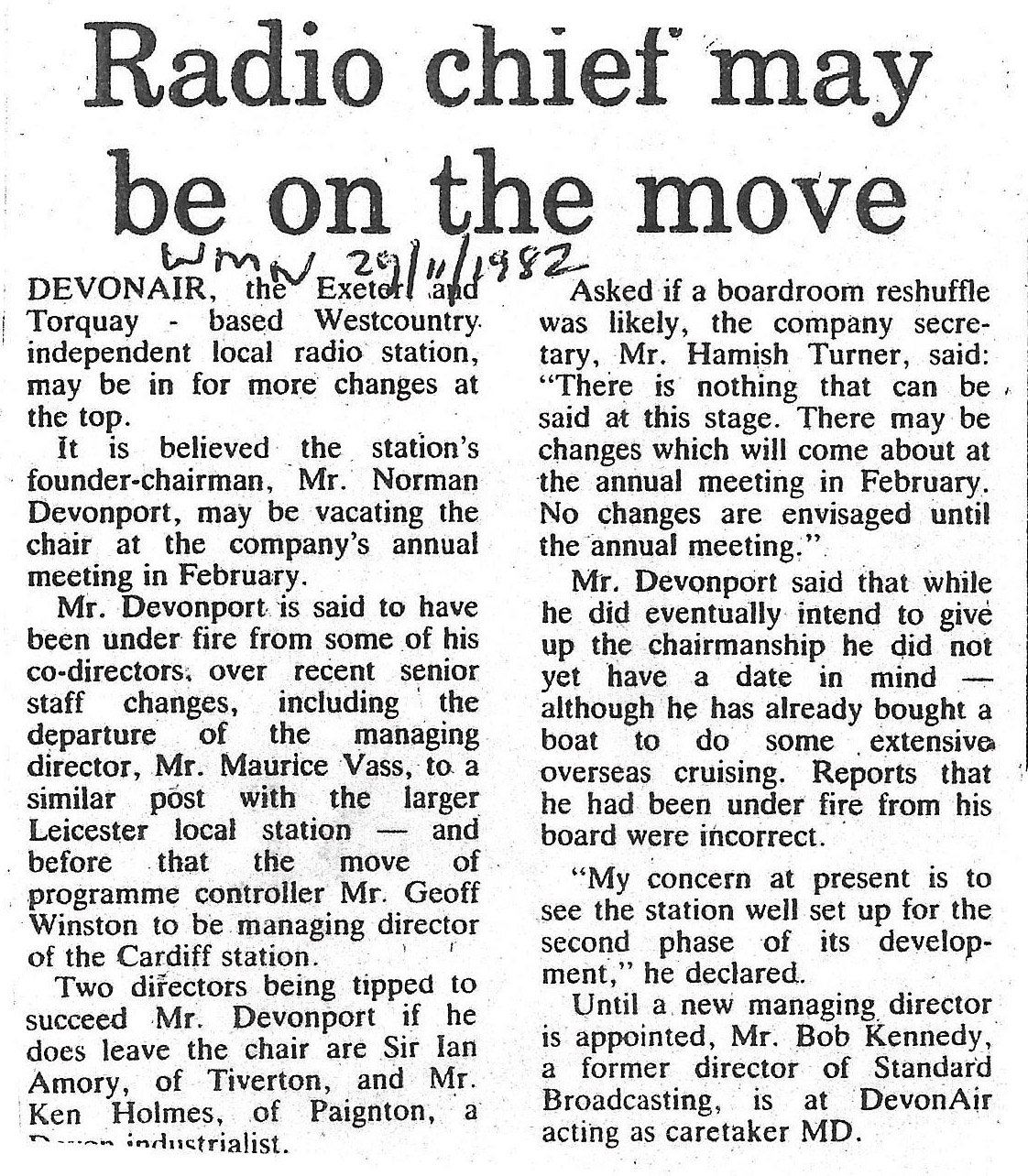
Radio Chief May Be On The Move – 1982
DEVONAIR, the Exeter and Torquay-based Westcountry independent local radio station, may be in for more changes at the top.
It is believed the station’s founder-chairman, Mr. Norman Devonport, may be vacating the chair at the company’s annual meeting in February.
Mr. Devonport is said to have been under fire from some of his co-directors over recent senior staff changes, including the departure of the managing director, Mr. Maurice Vass, to a similar post with the larger Leicester local station — and before that the move of programme controller Mr. Geoff (Jeff) Winston to be managing director of the Cardiff station.
Two directors being tipped to succeed Mr. Devonport if he does leave the chair are Sir Ian Amory, of Tiverton, and Mr. Ken Holmes, of Paignton, a Devon industrialist.
Asked if a boardroom reshuffle was likely, the company secretary, Mr. Hamish Turner, said: “There is nothing that can be said at this stage. There may be changes which will come about at the annual meeting in February. No changes are envisaged until the annual meeting.”
Mr. Devonport said that while he did eventually intend to give up the chairmanship he did not yet have a date in mind — although he has already bought a boat to do some extensive overseas cruising. Reports that he had been under fire from his board were incorrect.
“My concern at present is to see the station well set up for the second phase of its development,” he declared.
Until a new managing director is appointed, Mr. Bob Kennedy, a former director of Standard Broadcasting, is at DevonAir acting as caretaker MD.
The article here titled “Radio chief may be on the move” was published in the Western Morning News on the 29th of November, 1982. It discusses the potential changes in leadership at DevonAir.
The article centres around the potential departure of Norman Devonport, the founder-chairman of DevonAir. It suggests that the station is entering a period of significant transition and may be on the cusp of a major leadership reshuffle, which could have a substantial impact on its operations and internal morale.
Analysis of Staff Feelings and Company Dynamics
- Tension Among Leadership:
- The article notes that Mr. Devonport has come under criticism from his own co-directors. This criticism appears to stem from dissatisfaction over recent senior staff changes, indicating a fractured leadership team and disagreements about the direction the station was heading.
- Senior Staff Departures:
- Key matches are highlighted, including:
- Maurice Vass, the former Managing Director, who left for a similar position at a larger local station in Leicester.
- Jeff Winston, the Programme Controller, who moved on to become the Managing Director of the Cardiff station.
- These departures are significant because they involve senior figures crucial to the station’s day-to-day operations and strategic direction. Such exits likely created a vacuum in leadership and decision-making, leaving the remaining staff feeling uncertain and insecure about their future.
- Key matches are highlighted, including:
- Uncertainty About Devonport’s Future:
- The article speculates about Norman Devonport possibly stepping down at the annual company meeting in February. While Mr. Devonport himself states that he has not yet set a date for his departure, he mentions plans for overseas cruising, suggesting that he is considering retirement or at least a step back from active management.
- This speculation would have contributed to a sense of instability and concern among the staff, as the potential loss of their founder-chairman during a time of existing turmoil might seem like an abandonment of leadership when the station needed stability.
Responses from the Company
- Comments from Hamish Turner:
- Hamish Turner, the Company Secretary, provides a cautious response when asked about a possible boardroom reshuffle. He states that no immediate changes are expected before the annual meeting in February.
- This non-committal statement suggests a lack of transparency from the management, likely leaving the staff feeling left in the dark and fueling rumours and uncertainty.
- Devonport’s Position and Intentions:
- Mr. Devonport attempts to downplay the speculation, denying that he is under pressure from the board. He insists that his current focus is on setting up the station for the next phase of development, but the article hints that his stance may not reflect the reality of the situation.
- His denial of being under fire from the board contrasts with earlier parts of the article, which imply significant internal disagreements. This discrepancy suggests either a PR move to maintain an image of stability or a disconnect between Devonport’s perspective and the experiences of others within the company.
Possible Successors and Implications
- Potential Replacements for Devonport:
- The article mentions two possible candidates tipped to succeed Devonport:
- Sir Ian Amory, from Tiverton, indicating an individual with strong local connections.
- Ken Holmes, an industrialist from Paignton, suggesting a business-oriented approach to leadership.
- The mention of these figures implies a potential shift in leadership style, possibly moving from the founding vision of Devonport to a more commercially focused direction.
- The article mentions two possible candidates tipped to succeed Devonport:
- Interim Leadership Arrangements:
- Until a permanent replacement is appointed, Bob Kennedy, a former director of Standard Broadcasting, is named as the acting caretaker Managing Director.
- Kennedy’s temporary appointment likely added a layer of uncertainty and interim management concerns, with staff unsure about the long-term vision and stability of the station.
Public Sentiment and Media Perception
- Impact on Staff Morale:
- The internal disputes and leadership changes, combined with the public airing of these issues, likely created a tense work environment. Employees may have felt demoralised by the lack of clear direction and the departure of key figures whom they trusted.
- The ongoing rumours about Devonport’s potential exit and the uncertainty around new leadership would have compounded feelings of instability and insecurity among the station’s employees.
- Local Media Involvement:
- The article’s publication in the Western Morning News, a local newspaper, highlights that the internal issues at DevonAir had become a matter of public interest. This media scrutiny would have put additional pressure on the board to clarify their position and resolve the issues swiftly.
The situation at DevonAir in 1982, as described in the article, reflects broader challenges often faced by young independent radio stations during this era, including leadership struggles, financial pressures, and the difficulties of adapting to a rapidly evolving media landscape.
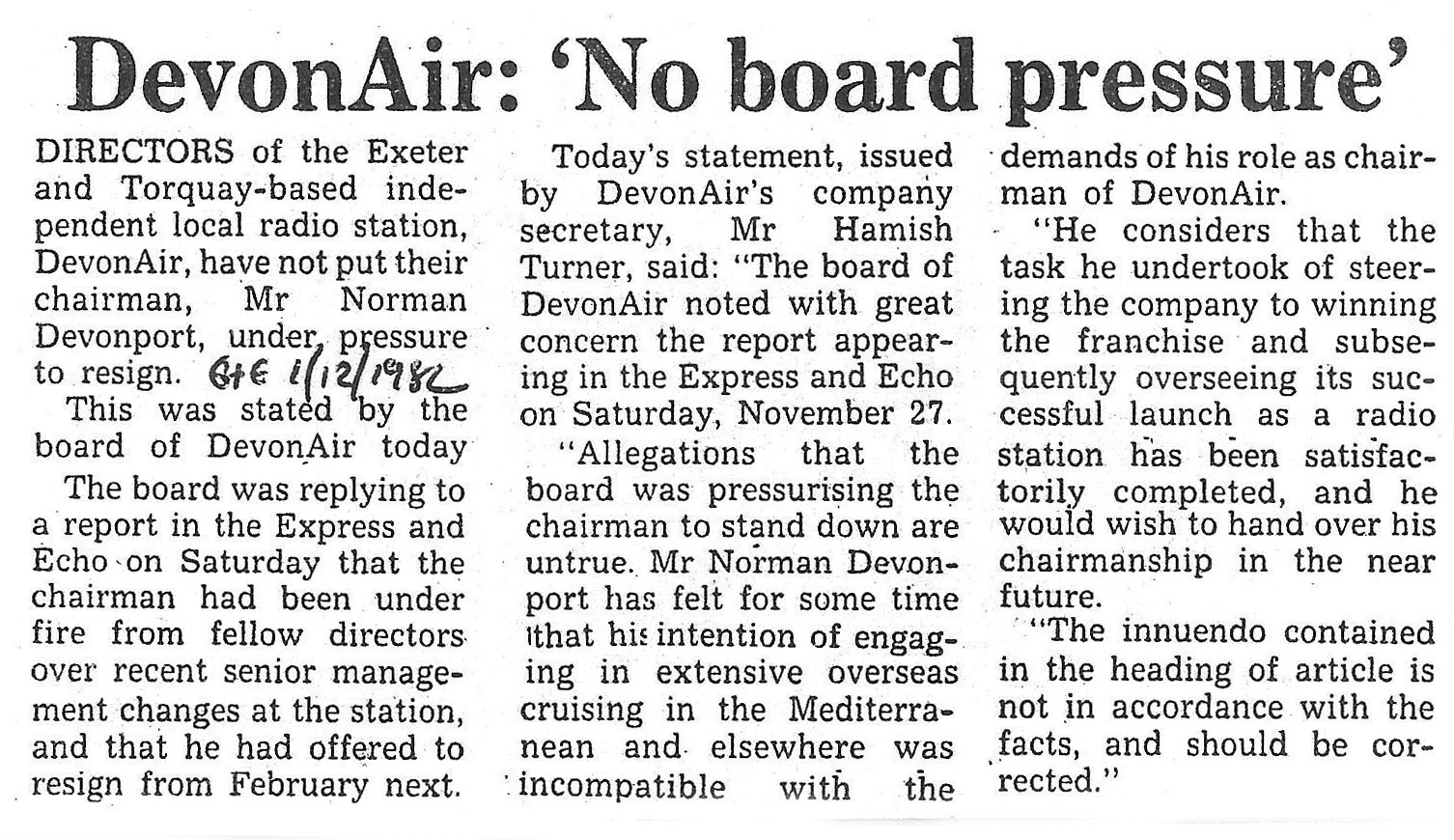
DevonAir: No Board Pressure – 1982
Directors of the Exeter and Torquay-based independent local radio station, DevonAir, have not put their chairman, Mr Norman Devonport, under pressure to resign. This was stated by the board of DevonAir today.
The board was replying to a report in the Express and Echo on Saturday that the chairman had been under fire from fellow directors over recent senior management changes at the station, and that he had offered to resign from February next.
Today’s statement, issued by DevonAir’s company secretary, Mr Hamish Turner, said: “The board of DevonAir noted with great concern the report appearing in the Express and Echo on Saturday, November 27.
“Allegations that the board was pressurising the chairman to stand down are untrue. Mr Norman Devonport has felt for some time that his intention of engaging in extensive overseas cruising in the Mediterranean and elsewhere was incompatible with the demands of his role as chairman of DevonAir.
“He considers that the task he undertook of steering the company to winning the franchise and subsequently overseeing its successful launch as a radio station has been satisfactorily completed, and he would wish to hand over his chairmanship in the near future.
“The innuendo contained in the heading of the article is not in accordance with the facts, and should be corrected.”
The item focuses on DevonAir’s response to earlier reports suggesting that the chairman, Norman Devonport, was under pressure to resign. The article serves as a rebuttal statement from the station’s board, aiming to address the circulating rumours and clarify their stance on Devonport’s position.
Prior news coverage had implied that Norman Devonport, the founding chairman, might be stepping down under pressure from the board due to dissatisfaction with recent management decisions.
Analysis of the Article
- Denial of Pressure from the Board:
- The article begins with a clear denial from DevonAir’s directors, asserting that they have not pressured Mr. Devonport to resign. This direct response aims to counter earlier reports suggesting internal conflict and division among the leadership.
- The fact that the board felt compelled to release a public statement indicates the seriousness of the rumours and the potential impact on the station’s reputation.
- Response to Previous Media Reports:
- The board specifically addresses a report published in the Express and Echo on the 27th of November, which claimed that Devonnport had been under fire from his co-directors. The board dismisses these allegations as untrue, suggesting that the earlier report contained inaccuracies and misinterpretations of the situation.
- By directly naming the previous article, the board is attempting to discredit the claims made and reassert control over the narrative.
- Norman Devonport’s Intentions:
- According to the statement issued by Hamish Turner, the company secretary, Mr. Devonport had already been considering his resignation independently of any board pressure. He expressed a desire to focus on overseas cruising in the Mediterranean, implying a voluntary and planned exit from his role rather than a forced resignation.
- This portrayal of Devonport’s intentions aligns with a narrative of a natural transition, suggesting that he feels his responsibilities—particularly in guiding the company through its early stages and securing the radio franchise—have been satisfactorily completed.
- Concerns About the Article’s Heading:
- The board’s statement criticises the “innuendo” contained in the previous article’s heading, arguing that it was misleading and not in line with the facts. This criticism reflects a broader concern from the management about how internal matters are being portrayed in the local press, and it underscores the potential damage that sensational reporting can cause.
- By requesting a correction, the board is taking a proactive stance in defending its position and attempting to mitigate the fallout from negative media coverage.
Feelings Among DevonAir Staff in 1982
- Confusion and Mistrust:
- The conflicting reports about whether Devonport was under pressure or planning a voluntary departure likely created confusion among the staff. Mixed messages from the leadership and the media would have contributed to an atmosphere of uncertainty and mistrust.
- Employees may have questioned the true reasons behind the senior management changes, leading to speculation and unease about the station’s stability.
- Demoralisation from Unstable Leadership:
- The public disputes and denials indicate a lack of cohesion at the top level of the organisation. For staff members, witnessing these leadership conflicts would have been demoralising, as it suggested that the company was not united in its vision or direction.
- The high turnover of senior figures, including the potential resignation of the founding chairman, could have left staff feeling disoriented and anxious about the future.
- Perception of a Leadership Crisis:
- Despite the board’s reassurances, the ongoing media coverage of internal issues at DevonAir points to a perception of a leadership crisis. The repeated need for public statements and returns suggests that there were unresolved tensions and a lack of effective communication within the company.
- Staff members might have felt caught in the middle of a power struggle, unsure whether to trust the official narrative or the reports of internal dissent.
Impact on Public and Media Perception
- Damage Control by the Board:
- The article reflects a damage control effort by the board of directors. By issuing a formal statement and denying the allegations, they aim to project an image of stability and unity, despite the earlier reports suggesting otherwise.
- However, the need for such a statement also indicates that the board was aware of the potential reputational damage caused by the negative press and felt it necessary to take swift action to address it.
- Transparency and Credibility Issues:
- The board’s strong denial, combined with the criticism of the previous article’s heading, may have been seen by some as an attempt to suppress dissenting voices or control the narrative. This could have been backfired, leading to further speculation and reducing the credibility of the leadership’s claims.
- The public might have perceived the board’s defensive stance as evidence that there was indeed trouble behind the scenes, despite their insistence to the contrary.
The resignation of Norman Devonport as chairman of DevonAir at the February 1983 AGM marked the end of an era for the local radio station. Devonport had been a central figure in securing the initial broadcasting franchise and leading the station through its early, formative years. His departure, amid ongoing internal disputes and a climate of uncertainty, meant a major turning point for DevonAir.
A Complex Legacy
Devonport’s leadership was often seen as divisive. On one hand, he was instrumental in the station’s launch, bringing DevonAir to life as one of the early independent local radio ventures in the West Country. His role in shaping its mission and identity cannot be understated. However, the latter part of his tenure was marred by internal conflicts, staff dissatisfaction, and public disputes that revealed cracks in the company’s foundation. The media coverage leading up to his resignation highlighted boardroom disagreements and a leadership struggle that became a matter of public concern.
A Sudden and Tragic End
Only five months after his resignation, Norman Devonport passed away aboard his boat, the ‘Devon Dawn’, during what was likely intended as a period of reflection and personal retreat. His death at sea is both poignant and symbolic, marking a final departure from the turbulence of the corporate world he had navigated with varying success. The circumstances of its passing add a layer of tragedy and finality to the story of DevonAir’s early years, leaving an indelible mark on the station’s history.
The Aftermath and Impact on DevonAir
Devonport’s resignation and subsequent death left a power vacuum at DevonAir, plunging the station into a phase of uncertainty. With the loss of its founding chairman, the company faced the immediate challenge of redefining its leadership and strategic vision. The board had already appointed Bob Kennedy as a caretaker managing director, but a permanent successor had yet to be established, causing unease among the remaining staff and stakeholders. That was successor to be Ken Whittaker who’s time in the role was to be short-lived.
The period following Devonport’s exit was marked by a series of attempts to stabilise the station and refocus its efforts in a competitive market, especially as it faced increasing pressure from rivals like BBC Radio Devon. The shadow of Devonport’s leadership, with its mix of visionary ambition and later conflict, continued to loom large over the company’s operations.
At the AGM in February 1983 Norman Devonport resigned as Chairman, he died five months later on board his boat ‘Devon Dawn’.
Recession and Competition Hit Local Radio Revenue – 1984
DevonAir suffers £150,000 loss

DevonAir suffered a £150,000 loss in the year ended 30 September 1983.
Sir Ian Amory, chairman, told the company’s annual meeting in Exeter that the outlook for this year was optimistic, and that advertising turnover was on target. The annual report showed that turnover had dropped from £746,000 in 1982, to £632,570.
Sir Ian said that the year had been disappointing, with income 15 percent lower as the recession hit advertisers in the Exeter and Torbay areas. At the same time, the company had spent more to combat the competition presented by TSW and the new BBC Radio service.
“The success of our campaign can be measured by the increase in the number of listeners we now have compared with the autumn of 1982,” he said.
Sir Ian recalled that a number of staff who had played a big part in building up the station successfully, had left to join other radio companies early in the year. The extra spending was incurred to maintain standards while the new team settled down. “The combined effect of lower income and higher expenditure produced a loss for the first time since the station opened, of almost £150,000,” he said.
Sir Ian, speaking of the continuing high standards of output, referred in particular to the broadcasts covering the two royal events in Exeter Cathedral: the Royal Maundy service and the St. John Ambulance concert, which were highlights of the year.
Sir Ian praised the generosity of DevonAir listeners in supporting the Devon Care appeal which raised more than £115,000 for charity. Advertising was still difficult to obtain, but income was now on target.
He praised the efforts of Mr. David Cousins, the new programme director, and said that exciting initiatives were being taken, and although spending still needed to be controlled, the board looked forward to making progress during the year.
As already reported, Devon’s other independent local radio station, Plymouth Sound, also suffered a loss last year of £15,000.
Analysis and Explanation
The article from the Western Morning News discusses the financial challenges faced by DevonAir in the year ending September 30, 1983. The station reported a significant loss of £150,000, marking a substantial downturn compared to previous years.
Key Points:
- Financial Loss and Decline in Revenue:
- DevonAir suffered a £150,000 loss, a notable financial setback for the station. The article highlights that this was the first time since its launch that the station had recorded such a loss.
- Turnover Decline: The turnover dropped from £746,000 in 1982 to £632,570, reflecting a significant decrease in revenue.
- Impact of Recession and Competition:
- Sir Ian Amory attributed the loss to two main factors: the economic recession and increased competition from TSW (Television South West) and the new BBC Radio service.
- Advertising income was 15% lower, affecting the station’s financial performance. The recession particularly impacted businesses in the Exeter and Torbay areas, reducing their advertising spend.
- Staff Turnover and Increased Expenditure:
- The article mentions that several key staff members left the station to join other radio companies. This departure led to additional expenditure as the station invested in maintaining the quality of its broadcasts while training and integrating new staff.
- This increased spending, combined with lower revenue, created a double blow for DevonAir’s financials.
- High Standards and Community Engagement:
- Despite the financial challenges, Sir Ian highlighted the high broadcasting standards, citing coverage of two significant royal events at Exeter Cathedral: the Royal Maundy service and a St. John Ambulance concert. These events were considered highlights of the year.
- The station maintained strong community engagement, with listeners contributing generously to the Devon Care appeal, raising over £115,000 for charity. This underscores the loyalty and support of DevonAir’s audience.
- Positive Outlook and Future Strategies:
- Sir Ian expressed optimism for the coming year, noting that while advertising income had been challenging to secure, it was now back on target.
- He praised the efforts of David Cousins, the new programme director, and commended the innovative steps being taken to rejuvenate the station’s offerings.
- However, he also recognised the need for spending control, suggesting that the station needed to be cautious with its financial decisions to avoid further losses.
- Comparison with Competitor:
- The article briefly mentions that Plymouth Sound, another independent local radio station in Devon, also reported a loss of £15,000. Although this figure is significantly smaller than DevonAir’s loss, it indicates that the broader market was facing financial difficulties, not just DevonAir.
DevonAir Acts to Meet Losses – 1985
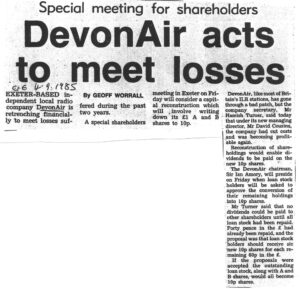
Exeter-based independent local radio company DevonAir is retrenching financially to meet losses suffered during the past two years.
A special shareholders meeting in Exeter on Friday will consider a capital reconstruction which will involve writing down its £1 A and B shares to 10p.
DevonAir, like most of Britain’s ILR (Independent Local Radio) stations, has gone through a bad patch, but the company secretary, Mr. Hamish Turner, said today that under its new managing director, Mr. David Cousins, the company had cut costs and was becoming profitable again.
Reconstruction of shareholdings would enable dividends to be paid on the new 10p shares.
The DevonAir chairman, Sir Ian Amory, will preside on Friday when loan stock holders will be asked to approve the conversion of their remaining holdings into 10p shares.
Mr. Turner said that no dividends could be paid to other shareholders until all loan stock had been repaid. Forty pence in the £ had already been repaid, and the proposal was that loan stock holders should receive six new 10p shares for each remaining 60p in the £.
If the proposals were accepted, the outstanding loan stock, along with A and B shares, would all become 10p shares.
Analysis and Explanation
The article focuses on DevonAir’s financial restructuring efforts in September 1985, aimed at stabilising the company after a challenging period marked by consecutive losses.
Key Points:
- Financial Struggles :
- DevonAir had experienced significant financial losses over the past two years. This indicates ongoing difficulties faced by the station, similar to the broader challenges encountered by the UK’s independent local radio (ILR) sector during this time.
- The article suggests that the economic climate, coupled with rising competition and declining advertising revenue, had impacted many ILR stations, not just DevonAir.
- Capital Reconstruction Proposal :
- A special shareholders meeting was called to discuss a major restructuring plan aimed at salvaging the company’s financial standing.
- The plan involved writing down the value of A and B shares from £1 to 10p. This is a drastic devaluation, indicating that the original share value had decreased significantly due to the financial difficulties.
- Leadership Changes and Cost-Cutting Measures :
- Under the new managing director, David Cousins, the company had implemented cost-cutting strategies to curb expenditures and was reportedly on the path to profitability. This highlights a proactive approach by the new management to address the financial challenges.
- David Cousins’ leadership seems to be a turning point, with the company taking measures to stabilise its finances and reduce operational costs.
- Shareholder Impact and Dividend Pay-outs :
- The restructuring plan aimed to enable the company to pay dividends on the newly valued 10p shares. However, it was made clear that dividends could only be paid once the loan stock (debt owed to certain creditors) had been fully repaid.
- Hamish Turner, the company secretary, explained that 40p in the £ of the loan stock had already been repaid. The proposal was to convert the remaining loan stock into six new 10p shares for every remaining 60p in the £. This suggests a focus on reducing debt obligations before returning any profits to shareholders.
- Shareholder Vote and Approval :
- The article mentions that the DevonAir chairman, Sir Ian Amory, would preside over the meeting. The key decision for shareholders was whether to approve the conversion of their remaining holdings into the devalued 10p shares.
- Approval of this proposal would result in all outstanding loan stock, along with the A and B shares, being converted to 10p shares. This action was necessary to streamline the share structure and provide a clearer financial pathway for the company.
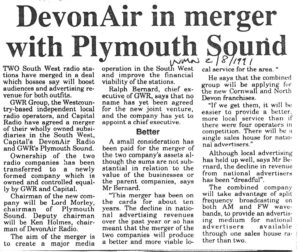
Two South West radio stations have merged in a deal which bosses say will boost audiences and advertising revenue for both outfits.
GWR Group, the Westcountry-based independent local radio operators, and Capital Radio have agreed a merger of their wholly owned subsidiaries in the South West, Capital’s DevonAir Radio and GWR’s Plymouth Sound.
Ownership of the two radio companies has been transferred to a newly formed company which is owned and controlled equally by GWR and Capital.
The chairman of the new company will be Lord Morley, chairman of Plymouth Sound. Deputy chairman will be Ken Holmes, chairman of DevonAir Radio.
The aim of the merger is to create a major media operation in the South West and improve the financial viability of the stations.
Ralph Bernard, chief executive of GWR, says that no name has yet been agreed for the new joint venture, and the company has yet to appoint a chief executive.
Better Prospects
A small consideration has been paid for the merger of the two company’s assets although the sums are not substantial in relation to the value of the businesses or the parent companies, says Mr Bernard.
“This merger has been on the cards for about ten years. The decline in national advertising revenues over the past year or so has meant that the merger of the two companies will produce a better and more viable local service for the area.”
He says that the combined group will be applying for the new Cornwall and North Devon franchisees.
“If we get them, it will be easier to provide a better, more local service than if there were four operators in competition. There will be a single sales house for national advertisers.”
Although local advertising has held up well, says Mr Bernard, the decline in revenue from national advertisers has been “dreadful.”
The combined company will take advantage of split frequency broadcasting on both AM and FM wavebands, to provide an advertising medium for national advertisers available through one sales house rather than two.
Analysis and Explanation
This article, published in August 1991, covers the merger between the two South West radio stations, DevonAir Radio and Plymouth Sound. The merger is a strategic move aimed at consolidating operations and addressing financial challenges exacerbated by declining advertising revenues.
Key Points:
- Details of the Merger :
- The merger involves two major players in the local radio market: Capital Radio’s DevonAir Radio and GWR’s Plymouth Sound. The ownership of these stations has been transferred to a newly formed company equally controlled by both parent companies, GWR and Capital Radio.
- The leadership structure of the new company has been established, with Lord Morley appointed as chairman and Ken Holmes, the chairman of DevonAir, serving as deputy chairman. However, the company has yet to decide on a new name or appoint a chief executive, indicating that some aspects of the merger are still in the planning phase.
- Strategic Rationale :
- The primary objective of the merger is to create a stronger and more viable media operation in the South West, capable of delivering improved services to the local audience. This consolidation is expected to boost both audience engagement and advertising revenue, providing a more sustainable business model for the combined entity.
- Ralph Bernard, the chief executive of GWR, notes that the merger had been in consideration for nearly a decade. The timing of the merger appears to have been influenced by the recent decline in national advertising revenues, which has put pressure on smaller independent stations like DevonAir and Plymouth Sound.
- Financial Considerations :
- The article mentions that a small consideration was paid for the merger of the two company’s assets, suggesting that the financial transaction was not substantial. This implies that the merger is more of a strategic alignment rather than a major financial acquisition.
- Bernard’s comment about the value of the businesses relative to the parent companies indicates that the merger was seen as a necessary step to stabilize operations rather than a lucrative investment. The focus is on creating a more efficient and viable local service rather than generating immediate financial returns.
- Plans for Expansion and Market Positioning :
- The newly formed company aims to apply for new broadcasting franchises in Cornwall and North Devon. Securing these franchises would enable the group to expand its coverage and potentially gain a stronger foothold in the regional market.
- By reducing the number of competing operators from four to a unified entity, the merger aims to streamline operations and provide a better local service. The consolidation of sales efforts into a single sales house for national advertisers is expected to increase efficiency and reduce overhead costs.
- Challenges with Advertising Revenue :
- The article highlights a significant decline in national advertising revenue, which has negatively impacted the financial performance of both DevonAir and Plymouth Sound. While local advertising has remained relatively stable, the drop in national revenue has been described as “dreadful.”
- This revenue decline underscores the broader economic challenges faced by the radio industry during this period, as traditional revenue streams from national advertisers were drying up. The merger is presented as a necessary response to these financial pressures, aimed at creating a stronger and more resilient business model.
- Future Broadcasting Strategy :
- The combined company plans to leverage split frequency broadcasting on both AM and FM wavebands. This approach is expected to provide greater flexibility in programming and offer a wider range of advertising options, making the new entity more attractive to national advertisers.
- The move to a single sales house for national advertising is part of the strategy to simplify and centralise advertising efforts, making it easier for national brands to place ads across the combined network of stations.
DevonAir staff are stunned as the station loses its license – 1993
Radio daze
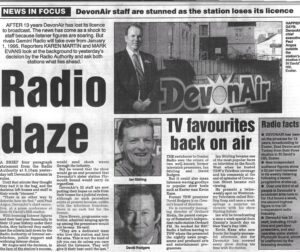
AFTER 13 years DevonAir has lost its license to broadcast. The news has come as a shock to staff because listener figures are soaring. But rivals Gemini Radio will take over from January 1, 1995. Reporters KAREN MARTIN and MARK EVANS look at the background to yesterday’s decision by the Radio Authority and ask both stations what lies ahead.
A brief four-paragraph statement from the Radio Authority at 8.15 am yesterday left DevonAir’s dreams in ruins.
Until that minute they thought they had it in the bag, and the decision left management and staff in their words “stunned.”
“There is no other way to describe how we feel,” said Paul Angus, DevonAir’s chief executive. Speaking outside the station’s St David’s Hill studios, and with booming listener figures to support his claims, he looked visibly shaken.
In their 13-year history under their belts, they believed they frankly deserved another chance as the Radio Authority listener satisfaction survey, public support, and advertising income had shown.
For Angus, who took over as chief executive to build on the station’s success, the news was devastating. “It is a body blow to the staff and to me personally,” he said.
But he vowed that the show would go on and promised that DevonAir’s sister station Plymouth Sound would carry on regardless.
DevonAir’s 32 staff are now putting their hopes on calls from their bosses for a judicial review, although no such procedure exists at present because, unlike with television franchises, there is no cash for failed license bids.
Dave Bowen, programme controller, was among the presenters spurred on by the decision. He said: “We have a dedicated team who love this station and what it offers. This is not the kind of decision anyone who loves local radio wants to hear, but we will fight on at least until the last.”
TV favourites back on air
The switchover to Gemini Radio sees the return of two well-known former television presenters, Ian Stirling and David Rodgers.
But it could also mean listeners waving goodbye to popular shows such as Exeter man Kevin Kane.
Former TSW presenter David Rodgers is on Gemini’s board of directors.
Ian Stirling, who became one of the most popular faces on television in the South West when he hosted TSW’s Telethon coverage and reported from locations like Exeter’s Sidwell Street, became quite famous.
Ian will be broadcasting on Gemini’s first show since New Year’s Day 1995.
With the hugely successful former faces of TSW on air, Gemini is banking on strong listener engagement and support from the outside.
Radio facts
- DEVONAIR has been on the airwaves for 13 years, broadcasting to Exeter, East Devon, and Torbay from their three studios in St David’s Hill, Exeter.
- New Independent Radio stations faced a 32 percent increase in regulatory costs this year alone, putting pressure on smaller operators.
- DevonAir achieved the second highest listener satisfaction rating of all UK local independent stations but was still unsuccessful in retaining its license.
- Gemini Radio will now take over the broadcast license starting January 1, 1995.
Analysis and Explanation
The article covers the unexpected news that DevonAir had lost its broadcasting license after 13 years on the air. The license has been awarded to its competitor, Gemini Radio, leaving DevonAir’s management and staff shocked, given their strong listener figures and public support.
Key Points:
- License Loss and Impact on DevonAir :
- DevonAir’s loss of the license is portrayed as a surprising and devastating blow to the station’s staff and management, particularly to Paul Angus, the chief executive, who expressed disbelief and disappointment.
- Despite the station’s strong listener figures and high satisfaction ratings, it was unable to secure the license renewal. The reasons behind the decision by the Radio Authority are not fully explained in the article, leaving room for speculation about the process.
- The emotional response from Angus and other staff members indicates a sense of injustice, especially as they believed they had met or exceeded the criteria for license renewal.
- Public and Staff Reaction :
- The announcement has clearly affected the morale of the DevonAir team. Staff, including programme controller Dave Bowen, expressed their commitment to the station and their determination to continue broadcasting until the very end of their license period.
- The article highlights a sense of loyalty and dedication among the DevonAir team, suggesting that the station had built a strong internal culture and a supportive community of listeners.
- Future Uncertainty and Legal Considerations :
- DevonAir’s management is exploring the possibility of a judicial review, although the article notes that no official mechanism exists for appealing the Radio Authority’s decision in radio licensing, unlike with television franchises.
- This points to a broader issue within the regulatory framework, where independent radio stations have limited recourse if they lose their license, potentially disadvantaging smaller or regional broadcasters.
- Gemini Radio’s Takeover :
- Gemini Radio is set to take over the license from January 1, 1995, and is already planning a strong launch with notable presenters, including former television personalities Ian Stirling and David Rodgers.
- Gemini Radio appears to be positioning itself as a fresh and dynamic alternative, banking on the popularity of familiar TV faces to attract listeners and establish its brand quickly.
- Financial Pressures on Local Radio :
- The article notes that new independent radio stations are facing increased regulatory costs, with a 32 percent rise in fees, which may have contributed to DevonAir’s struggles.
- This financial strain is highlighted as a significant challenge for smaller operators like DevonAir, who may not have the resources to cope with rising costs compared to larger, more financially robust competitors.
- Industry Implications :
- The decision to award the license to Gemini Radio despite DevonAir’s strong listener ratings reflects broader trends in the radio industry towards consolidation and the favouring of stations with greater financial backing.
- The mention of the regulatory cost increases suggests a shifting landscape where smaller, community-focused stations may be increasingly squeezed out by larger corporate players.
Conclusion
The loss of its license marks a major turning point for DevonAir, signalling the end of its 13-year history as a beloved local broadcaster. The emotional response from staff and management highlights the deep sense of attachment to the station and its community. However, the decision also underscores the harsh realities of the radio industry, where financial pressures and regulatory challenges can overshadow listener satisfaction and public support.
The takeover by Gemini Radio sets the stage for a new chapter in local broadcasting, with a focus on leveraging high-profile presenters to capture audience interest. For DevonAir, the transition is bittersweet, as they must now contend with the abrupt end of their journey, despite their best efforts to maintain strong engagement and deliver quality programming.
The Revengeful Franchise Bid
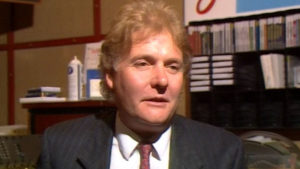
DevonAir Radio lost its broadcast franchise in 1994 following a bitter campaign by various groups to oust the incumbent.
In 1994 the then Chairman, Kenneth Holmes, proudly stated:
“The year to 30th September 1994, in financial terms, has been the most successful in the company’s history” and then later in the document he reported (in the final paragraph of the last ever Chairman’s report):
“The listening public of Devon has been deprived of what, in recent times, it has shown to be its preferred station. This is a matter of much regret. We, as the company, are proud of the achievements of DevonAir and all the staff, past and present, who have been responsible for this.”
David Cousins was one of DevonAir ’s Programme Controllers and Managing Directors: “I was sad to leave ( DevonAir ), disliked the management at Capital Radio who had bought the company. I got my own back by winning back the license 18 months later!” (full article here )
David Cousins’ story at DevonAir is one of significant contributions, strategic leadership and occasional controversy. From writing the original franchise application to guiding the station through financial challenges, his influence was substantial. His later involvement with Gemini Radio adds a complex chapter to his career, showcasing his industry knowledge and adaptability. Ultimately, Cousins played a pivotal role in the history of DevonAir, shaping its direction and leaving a lasting impact on the station’s legacy.

